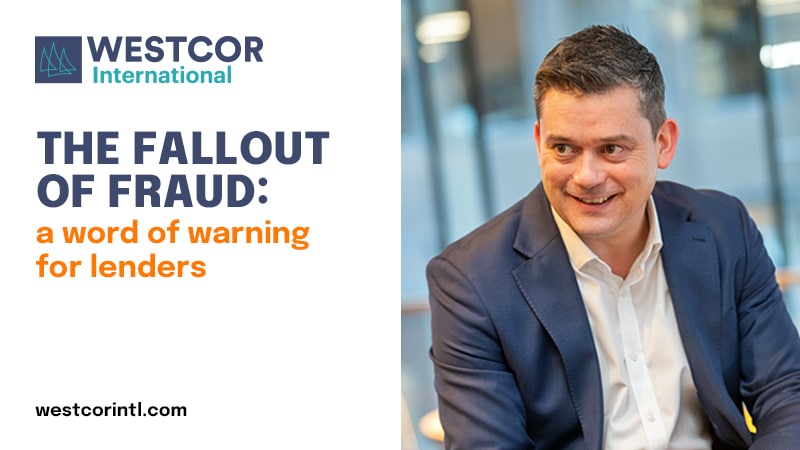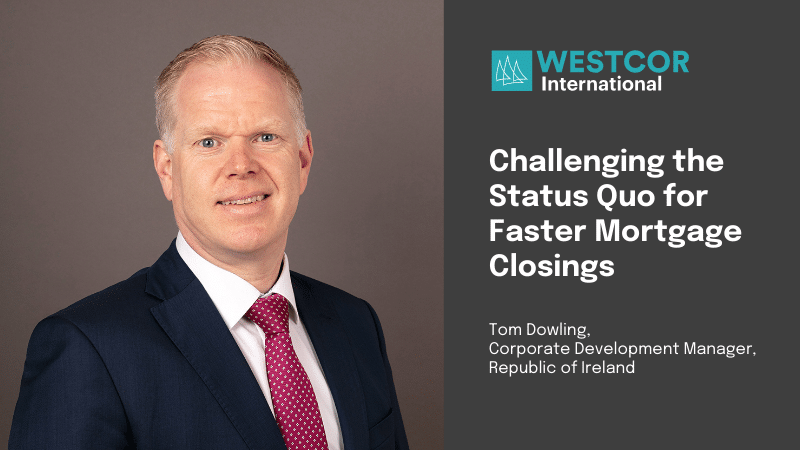The fallout of fraud: a word of warning for lenders

Image: Christopher Taylor, Corporate Development Director at Westcor International
Christopher Taylor, Corporate Development Director at Westcor International, examines the startling increase in fraud cases over the past year and urges lenders to practice vigilance.
Claims against lenders have risen by an astonishing 100% in the last six months, spurred by an increase in fraud and solicitor negligence.
Historically, fraud in our arena was associated with imposter fraud, but the nature of deception permeating the market is morphing. It’s now much more nuanced and complex.
Surprisingly, the acceleration in claims hasn’t been triggered by nefarious individuals running off with large sums of money. Instead, we’re seeing an increasing number of unscrupulous borrowers telling-what they believe to be-white lies to lenders, misguidedly thinking these fabrications will never reach the surface.
Often, these claims come in masquerading as something else-for example, a borrower’s solicitor failing to register the lender’s charge at the Land Registry. Of course, in some instances, negligence is to blame for failed undertakings, but just as often, they boil down to deception. Now, solicitors may not consider themselves fraudsters in these instances, but this can nevertheless be the case, and it’s troublingly prevalent.
Foreboding forbearance and disguised deception
While the increase in claims is undoubtedly worrying, it’s not unexpected. From our experience, claims track the economic cycle. When the economy suffers a downturn, people become more desperate.
In many cases, fraud has gone undetected because failure to exit on loans has been masked by lenders using forbearance to extend terms. As long as the merry-go-round turns, borrowers can bounce from one lender to another.
It’s when the forbearance period ends that problems start, and the latent issues bubble to the surface. If the loan documents were poorly executed, it is the last lender of record left holding the problem, and they may struggle to enforce their security if an inexperienced firm has failed to follow their instructions.
Underwriters undervalue the risks
The short-term lending space is particularly vulnerable to the fallout of fraud, given its focus on traditional underwriting rather than data-driven decision-making.
We have seen a prolific number of new companies enter the arena, often lacking in experience but abundant in the hope for strong returns with little perceived risk attached. Unfortunately, most have failed to assess the risks accurately.
After all, deceptive individuals and brokers often target lenders they deem to have less experience, less robust processes and an insatiable appetite to lend, affording them a greater chance of getting loans approved.
Beyond this, we must also remember that an increasing pool of lenders is competing for less business. As a result, many are taking greater risks without adequate safeguards in place enabling them to mitigate the risks. By safeguards, of course, I mean a robust tech platform that enables lenders to proactively uncover the risks that lie ahead.
At the same time, loan sizes are becoming much more significant. It wasn’t too long ago that our cover for a loan capped out at £2 million. Now, this would only cover a small proportion of lending being issued by our clients.
As an example, we’re working on a loan of £50 million at the moment. These double-digit million-pound loans have become the norm. There are vast amounts of money going through the system, most of which are completed by quite small and inexperienced law firms.
Greater risk requires greater diligence
As the risks proliferate, we have started asking our clients which solicitors they are using; we’re even considering the introduction of greater scrutiny and due diligence over those firms.
Understandably, we prefer that tried, trusted, and experienced firms register charges. Whilst we have yet to go so far as to insist on this level of control, it is something currently under consideration.
We understand the temptation to let commercial pressures overrule risk mitigation, but lenders choosing solicitors based on price—and with haste—typically fail to ask the right questions to protect their clients.
In most claims, the losses made would have been mitigated had the lenders worked with trusted and experienced specialists to complete their loans.
Given the significant nature of these issues, more discussion is needed to raise awareness, which is why Jonathan Newman, Senior Partner at Brightstone Law, and I will host a select seminar to discuss the rising trend of fraud. We strongly urge lenders to attend.
As Jonathan notes: “We are really concerned about some very dangerous trends in the market. There is so much scope for dishonesty in this industry, and the amount of human time and resources to identify it can be overwhelming.”
“We may be in a challenging economic environment, but there’s an exponential growth in claims, and it needn’t be like that. It’s in everyone’s interest that we address these challenges. Anyone interested in attending our seminar should get in touch. We don’t think lenders can afford to miss it.”





